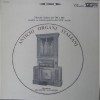Composers
Antonio Valente (fl. 1565–80) was an Italian Renaissance organist and composer. He was blind from childhood and served as organist of Sant'Angelo a Nilo in Naples in 1565–80. During that time he published two collections of organ music: Intavolatura de cimbalo (1 fantasia, 6 ricercares, Salve regina, 3 intabulations, 6 sets of variations, and 3 dances; 1575) and Versi spirituali (43 versets; 1580). Nothing else is known about his life. In 1601 he was listed among the deceased organists of Naples.
Valente's second collection is historically important as one of the earliest instances of liturgical music free from any ties with the chant. Versi spirituali provides a wealth of diverse, freely composed pieces that cover the entire liturgy—the Mass and the Daily Offices. Valente's 1575 print, although of considerably lower quality, is also a major landmark in the history of Italian keyboard music, for together with Rocco Rodio's Libro di ricercate (1575) it constitutes the earliest work of the so-called Neapolitan school, which later produced composers such as Ascanio Mayone and Giovanni Maria Trabaci.
Refine by search
view all| Country: | Italy |
| Period: | Renaissance |
Biography
Antonio Valente (fl. 1565–80) was an Italian Renaissance organist and composer. He was blind from childhood and served as organist of Sant'Angelo a Nilo in Naples in 1565–80. During that time he published two collections of organ music: Intavolatura de cimbalo (1 fantasia, 6 ricercares, Salve regina, 3 intabulations, 6 sets of variations, and 3 dances; 1575) and Versi spirituali (43 versets; 1580). Nothing else is known about his life. In 1601 he was listed among the deceased organists of Naples.
Valente's second collection is historically important as one of the earliest instances of liturgical music free from any ties with the chant. Versi spirituali provides a wealth of diverse, freely composed pieces that cover the entire liturgy—the Mass and the Daily Offices. Valente's 1575 print, although of considerably lower quality, is also a major landmark in the history of Italian keyboard music, for together with Rocco Rodio's Libro di ricercate (1575) it constitutes the earliest work of the so-called Neapolitan school, which later produced composers such as Ascanio Mayone and Giovanni Maria Trabaci.




![Great European Organs. 39-Nicholas Jackson [Segovia Cathedral]](http://static.classicalm.com/repository/collection-cover/small/917-img1341761014261487.jpg)
